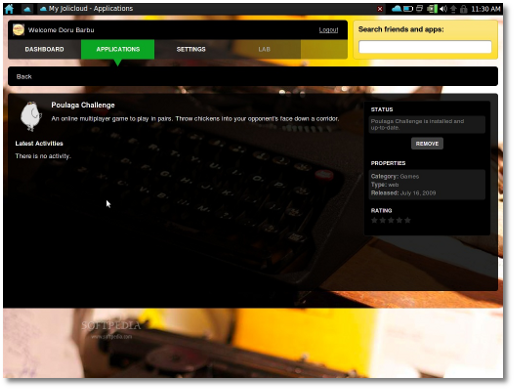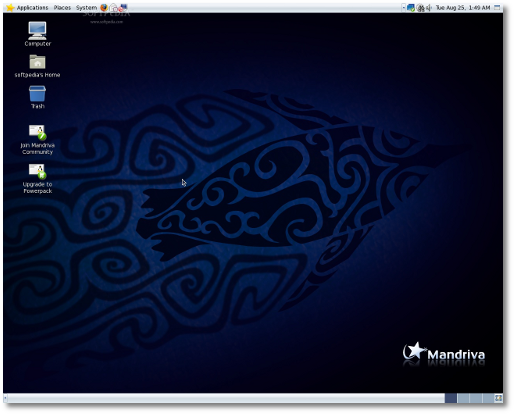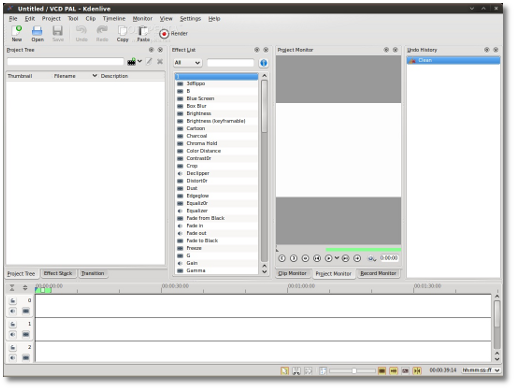Welcome to the 59th issue of Softpedia Linux Weekly!
For this edition, we offer you a first look at the upcoming Jolicloud operating system for netbooks. The following Linux distributions have been announced last week: Mandriva Linux 2010.0 Beta. In other news: AMD released ATI Catalyst 9.8, now with support for Ubuntu 9.04 (Jaunty Jackalope); Pidgin 2.6 brings audio and video support; Canonical prepares a revamped installer for the upcoming release of the Ubuntu operating system; Google releases a true 64-bit version of its popular Google Chrome web browser and, last week, we celebrated 40 years of UNIX. An in-depth review of the Kdenlive 0.7.5 application is also present in this edition. The weekly ends with the video clip of the week, the latest Linux distributions released/updated last week and the development releases.
 Summary:
Summary:

 First Look: Jolicloud Alpha 2c
First Look: Jolicloud Alpha 2c
From the article: If you are expecting a new or groundbreaking way to work with your desktop or some mind-blowing graphics (as we were), Jolicloud Alpha 2c will probably let you down. After booting, which bears all the indications that this distro bases itself on Ubuntu, you will be greeted by the Ubuntu Netbook Remix launcher, with a black desktop background and two icons on the launcher. One of them points to Firefox and the other, "Get Started," will allow you to see what Jolicloud is all about.
Bottom line, Jolicloud deserves all the attention that it's getting right now. We don't feel that the social component in its current state will be a very useful addition, but, if the developers extend it so that it integrates with the desktop synchronization functions and other social networking websites, it may just become a central feature. The all-around optimizations make this operating system a real alternative for netbook owners, as they work wonders even for those rather old, first-generation devices that are already beginning to appear as pieces of computer history to us.
Read the entire article here.

 On August 22nd, Mandriva announced the beta release of the upcoming Mandriva Linux 2010.0 operating system. The features of this release include the KDE 4.3 and GNOME 2.28 Beta desktop environments, as well as Linux kernel 2.6.31 RC6 and X.Org Server 1.6.2. But the really good news is that Mandriva has finally decided to replace that old Splashy boot splash manager with the popular Plymouth, produced by Red Hat.
On August 22nd, Mandriva announced the beta release of the upcoming Mandriva Linux 2010.0 operating system. The features of this release include the KDE 4.3 and GNOME 2.28 Beta desktop environments, as well as Linux kernel 2.6.31 RC6 and X.Org Server 1.6.2. But the really good news is that Mandriva has finally decided to replace that old Splashy boot splash manager with the popular Plymouth, produced by Red Hat.
Highlights of Mandriva Linux 2010.0 Beta:
· Plymouth boot splash manager; · Linux kernel 2.6.31 RC6; · KDE 4.3.0; · GNOME 2.27.90; · Xfce 4.6.1; · X.org Server 1.6.2; · OpenOffice.org 3.1.0; · KOffice 2.0.1; · Amarok 2.1.1; · Digikam 1.0 Beta 3; · Kipi plug-ins 0.5.0; · KMess 2.0.0; · Apache 2.2.22; · PHP 5.3.0; · Python 3; · VirtualBox 3; · Improved Drakxtools; · Device permission handling changes.
Download Mandriva Linux 2010.0 Beta right now from Softpedia. Remember that this is a beta release and it should not be installed on production machines. It is intended for testing purposes only.
· Advanced Micro Devices announced on August 17th a new version of its versatile ATI Catalyst proprietary Linux display driver, for both x86 and x86_64 architectures. The ATI Catalyst 9.8 suite updates the software to version 8.64 and brings support for Red Hat Enterprise Linux 4.8 and Ubuntu 9.04 (Jaunty Jackalope). Read more about it here.

· Pidgin users have a lot of things to be happy about with the release of the 2.6.0 version of their favorite instant messaging application, announced on August 19th by John Bailey. Thanks to the hard work of developers and contributors, Pidgin 2.6 has a plethora of new features, about 221 bug fixes, all listed in a changelog so big that it makes you think about Christmas wish lists. For the video and audio part we have Mike Ruprecht to thank, who started implementing these features back in 2008, in a Google Summer of Code project, so it was a lot of work to get this far. Read more about it here.

· Canonical is working hard these days to redesign the Ubuntu installer (also known as Ubiquity) into something a little more in tune with our times. We've already told you in our latest report on Ubuntu 9.10 (Karmic Koala) Alpha 4 that Ubiquity has now a "Quit" button during all the installation steps, so you can quit the installer at any time. Moreover, the time zone selection items have been changed a little to reflect the region/zone only, and not the city. An Ubuntu-flavored slideshow for the Ubiquity installer will display some content, every 20 seconds or so, especially created to introduce new users to the Ubuntu operating system, while installing it. Read more about it here.

· The Google Chrome developers announced on August 19th the immediate availability of a new version of the Google Chrome web browser for Linux, Windows and Macintosh operating systems. Google Chrome 4.0.202.2 is here to fix a lot of annoying bugs and it also adds a couple of features only for the Mac platform. However, the good news is that Dean McNamee, one of the Google Chrome engineers, announced on their mailing list that a working port of the Chrome browser for 64-bit platforms was available for download. Read more about it here.

· Happy 40th birthday, Unix! It is a long and twisted story that marks the various phases through which the Unix operating system passed. It has been going on for 40 years, and signs show that it won't end anytime soon. Unix's impact on today's computing experience is extremely significant. It popularized the idea of using higher level programming languages for creating operating systems, simplified the file model, showed the advantages of the hierarchical file system with an arbitrary number of levels, made the command interpreter an ordinary program, with commands being programs themselves, and this list could go on for a long while. Read more about it here.

 Review of the Week: Kdenlive 0.7.5
Review of the Week: Kdenlive 0.7.5
From the review: Kdenlive's name stands for KDE Non-Linear Video Editor, and that pretty much summarizes what this application is all about. It supports all the formats that FFMpeg can handle (and it's quite an impressive list), multiple aspect ratios for your videos, various standards (PAL, NTSC, AVCHD, HDV), capture and export to DV devices, DVD creation. I can safely say that, if what you need is video-editing related, then there's a strong chance that Kdenlive can do it.
For home video editing, Kdenlive is probably one of the best applications that you can use. It can handle your small-sized projects quickly and with low overhead.
Read the entire review here.

 Video Clip of the Week: Unix History
Video Clip of the Week: Unix History
· For this week, we've posted a video clip about the history of UNIX, explained by Ken Thompson and Dennis Ritchie. The video has two minutes and 19 seconds and it was posted by yogesh4ever. Enjoy!
· penaOS 0.8 · Hannah Montana Linux
 Distributions Updated Last Week:
Distributions Updated Last Week:
· Astaro Security Linux 7.405 · AUSTRUMI 1.9.5 · Tor-ramdisk 20090821 · CentOS 4.8 · SLAMPP Live CD 2.0.1
· m0n0wall 1.3 Beta 18 · Vine Linux 5.0 RC1 · Pentoo LiveCD 2009.0 Beta · Frugalware Linux 1.1 RC2 · Tiny Core Linux 2.3 RC1 · CRUX 2.6 RC1 · openSUSE Linux 11.2 Milestone 6
See you again next Monday, August 31st, for another issue of Softpedia Linux Weekly.

 14 DAY TRIAL //
14 DAY TRIAL // 


